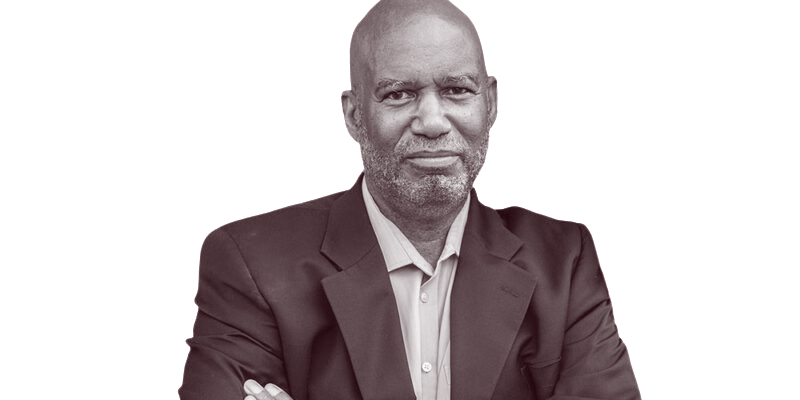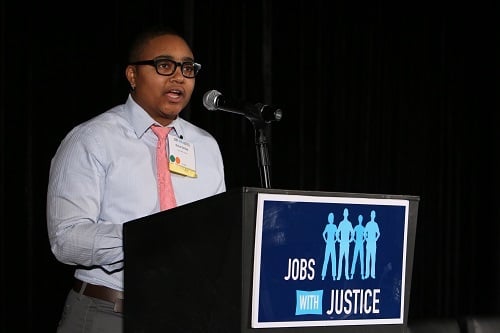For the past 15 years, Erica Smiley has worked for Jobs With Justice (JWJ), first as organizing director and now as executive director. JWJ’s national network brings together labor, faith, community and student organizations to make changes and build power for working families. Before coming to JWJ, Smiley organized with the Service Employees International Union, Tenants and Workers United in Virginia, and United for Reproductive and Gender Equality.
Steven Pitts interviewed Smiley in Episode #7 of Organizing Upgrade’s Black Work Talk podcast. This is just a taste of her comments in their wide-ranging conversation. Pitts had asked Smiley how we balance the need to pull together in a united front against white nationalism with the fact that some who oppose the white nationalists’ assault on democracy have their own ways of assaulting democracy.
Our opposition is not a monolith. There are active fascists and white nationalists coming at us with their pitchforks. There are people on the business right who claim to be with us and will put Black Lives Matter on their Twitter page but will fire any Black worker who tries to ask for personal protective equipment during the era of COVID. There’s the evangelical right which in some ways is creating moral validity for these terrorist actions that a lot of the fascists are waging. And then of course you have the radical libertarian right, I like to call it the big ideas right, which is very clear that democracy is a threat to their ultimate aims of individual liberty and wealth building, self-sufficiency and all this stuff, but sees what the white nationalists are doing as a real threat to that and tries to align their interests with us on social issues – but in fact we know that underneath that’s not the case at all.
And so, on the one hand, it’s really easy to get confused by this and feel like we have to just fight the white nationalists, or we could let the police fight the white nationalists like they should. They should be fighting the white nationalists instead of us. And we can try to take advantage of what are some real fissures in our opposition. This is the first time I can remember in a long time that the right is so fractured.
Part of what’s going to be important for us in this moment when we’re thinking about organizing and collective bargaining, when we’re thinking about Black strategies for building worker power, is that we have to do these in ways that take advantage of these fissures. For example, if Amazon is going to claim that Black lives matter after the egregious murder of George Floyd on national television, then we have to hold them to the fire in this vulnerable point in their reputation, to say, ‘If you really think Black lives matter, you have to support Black workers who are organizing and trying to collectively negotiate safer conditions, who are essential and making you billions of dollars.’
Bezos is a notorious example of this as well in terms of Amazon and the Bessemer organizing drive where you’ve got a workforce that’s very Black and you’ve got a company that in November was all about mail-in ballots in the political election now saying to the union members there shouldn’t be mail-in ballots because that would increase opportunities for fraud. So using the same messages they were fighting against in the political election to try to destroy the union election of particularly Black people in Alabama at their warehouse, over 5,000 Black workers.
On the one hand, these are disgusting. On the other hand, if we as a movement can be sophisticated and take advantage of those fissures to continue to drive our way in and define wins not just as the issues we’re able to win, the number of masks we’re able to get to workers, but actually define wins as how close we get to sitting in active governing positions within each of these companies or industries, then I think there’s an opportunity for us that we can’t miss. Many of us will remember in the 2008-2009 economic crisis, bailout, that we missed an opportunity. When an industry was in crisis, we bailed them out and didn’t ask for any form of public ownership out of that bailout.
Any industry that’s getting bailed out due to this terrible global pandemic must also then have some pathway for workers to participate in its governing structures. And any company that’s claiming to be in support of Black lives or against these fascist assaults on our country and our institutions has to actually then model that in their own company and industry, model what democracy could look like by increasing worker engagement. And that most direct path to that in a place like Bessemer is actually recognizing the union that the workers are demanding and negotiating with them in good faith.
We are so good at talking about the problem and so bad at trying to even imagine what it could look like. I have found that when we get into a space, when workers get into a room together and imagine what it could look like a lot of barriers really fall.
The biggest task in front of us is actually trying to imagine a democracy worth fighting for. Because if the people on the farthest outskirts of society, if the rural Black people in Clarksdale, Mississippi where my dad’s from, or in Suffolk Virginia, where my mom’s from or even in the rural Midwest, the white workers, if they don’t believe that your democracy is real for them they won’t fight for it and in some instances they will actively tear it down. So in addition to the work that’s in front of us on a day-to-day, we really have to make time to imagine a democracy worth fighting for.

